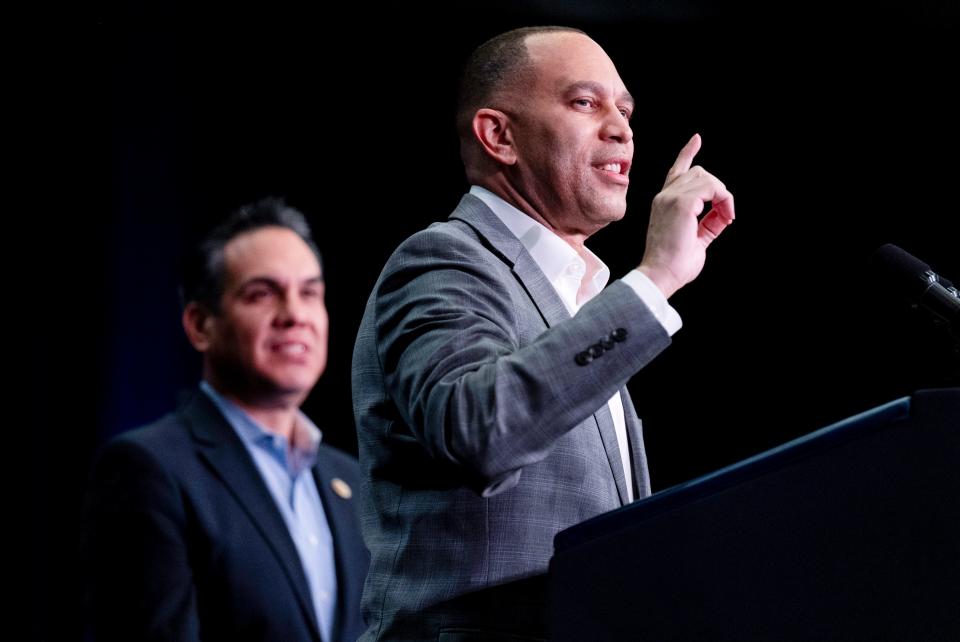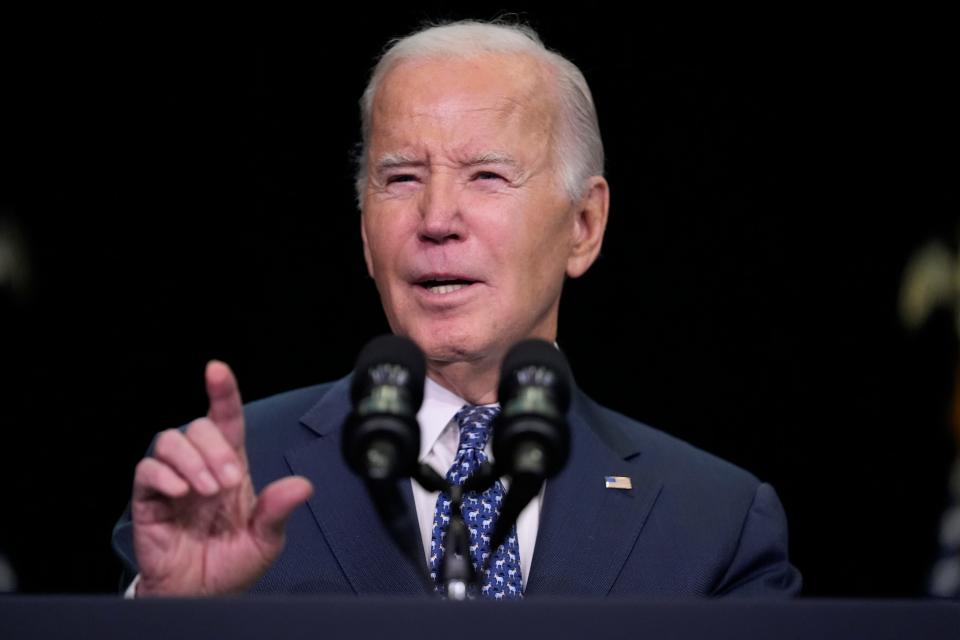House Democrats plan their 2024 comeback on abortion, economy and contrast with GOP
LEESBURG, Va. – House Democrats staked out their game plan this week at their annual retreat to reclaim power in the lower chamber in 2024, hoping they can find traction on abortion rights and the economy, even as a skeptical public gives President Joe Biden low approval ratings
The caucus needs to pick up just a handful of seats to take back control of the House next year. Democrats said they'd make the case to voters by highlighting their accomplishments in the last Congress – when they controlled the House, Senate and White House – and the differences between their party and Republicans. While Democrats are bullish on their chances to retake the House in 2024, they face an uphill climb to keep their majority in the Senate and several national polls show Biden trailing former President Donald Trump in a rematch.
"What's critical about this election is that it is fundamentally about our rights, our freedoms, our democracy and our future," Rep. Suzan DelBene, D-Wash., chair of the Democratic Congressional Campaign Committee, told USA TODAY. "We're in a place where we have folks who aren't serious about governing who are in the majority."
Multiple members said abortion would be front and center during the 2024 election, as voters consider the possibility that the next Congress could pass a federal abortion ban – or legal protections for abortion.
Rep. Annie Kuster, D-N.H., chair of the moderate New Democrat Coalition, told USA TODAY Republicans are "still living in a world that's an illusion" when it comes to abortion, ignoring the complicated consequences of the overturning of Roe v. Wade. In comparison, she argued, the Democratic Party will illustrate those consequences and focus on "giving everyone a voice."
"I think it bodes well for our connection with voters coming up," she said. "We look like them, we sound like them, we have the same life experience."
And drawing a contrast between themselves and House Republicans won’t be too difficult, House Democrats argued, considering the House GOP conference has been roiled in near-constant turmoil ever since they claimed control of the lower chamber last year.
"Unfortunately right now, Republicans with a small majority have been incapable of governing, aren't even interested in governing and can't even agree with themselves," DelBene said.

The biggest headwinds for Democrats, they claimed, is closing the messaging gap between the impacts of Democratic-led legislation and what voters are feeling at home. While inflation is cooling and job gains continue to surge, some prices on consumer goods continue to be higher than they were before 2021.
Rep. Greg Landsman, D-Ohio, a first-term lawmaker and vulnerable “Frontline” member, has been touting a $1.6 billion investment in a bridge in his district that was a direct result from President Joe Biden’s bipartisan infrastructure law. That bridge and “those stories,” Landsman said at a press conference, will turnout and energize Democratic voters.
“The empirical data all suggests that every proposal that we have promoted … is deeply popular with the American public,” Rep. Joe Neguse, D-Colo., chair of the House Democratic Policy and Communications Committee said at a press conference. Democrats will not only have to close the messaging gap, Neguse said, but also have to promise “what we will do if given the opportunity to govern.”
Multiple lawmakers noted that they passed massive economic packages when their party was in control in 2021 and 2022 – including the $800 billion clean energy and social policy law named the Inflation Reduction Act, the $1.2 trillion bipartisan infrastructure law, and the $1.9 trillion American Rescue Plan, an economic stimulus package passed amid the coronavirus pandemic.
But helping voters understand how those laws are impacting their lives will take compelling storytelling, they said.
Bragging about convoluted economic data, Rep. Lori Trahan, D-Mass., co-chair of the House Democratic Policy and Communications Committee said at a press conference, doesn’t “resonate” and Democrats have to turn to “talk about what people are actually feeling and they’re feeling an economy that is getting stronger.”
"It's about talking what we've done and what that has meant, but also the opportunity of what we can continue to do going forward," DelBene said.

Democrats have faced their own internal divisions within their caucus, particularly in regard to Israel's offensive in Gaza following Hamas' Oct. 7 attack. Progressive Democrats have called for an immediate ceasefire in the war while also pushing for conditioning any U.S. aid to Israel, drawing a stark contrast with more moderate pro-Israel Democrats who are heavily lobbying for continued U.S. support of the nation as it wages its war against Hamas.
Rep. Brad Schneider, D-Ill., a Jewish member, told USA TODAY that there is an opportunity for unity even on this issue: Members acknowledge both the “horrific urban warfare” happening in Gaza and the importance of continuing to support Israel.
“We all want a deescalation,” Schneider said. Any ceasefire, he said, “has to be something that is a pathway to peace and to the administration's credit, a peace where there is a pathway not just to the Palestinian and Israeli's aspirations of their own states and controlling their own destiny, but a regional peace.”
Biden swung by the retreat to deliver a keynote address to rally House Democrats and at the same time, to address a recent vote where the majority of House Democrats tanked a GOP-backed standalone Israel aid bill to hold out for a bipartisan, broader foreign aid package from the Senate. The broader package – currently being considered by the Senate – would send aid to Ukraine as well as Israel, which has been divisive among Republicans in both chambers.
"They weren't easy votes for you but all of you came through in a big way. All this just shows that when we're united, we can beat House Republicans and their cynical political games," Biden said, to cheers from Democratic members.
They touted a strong fundraising period compared with their Republican counterparts. At the end of 2023, the DCCC had raised $121.3 million over the year and had $53.4 million on hand, according to federal campaign finance filings. The National Republican Congressional Committee had raised $91.3 million and had $45.5 million on hand.
The New Democrat Coalition's PAC, NewDems Action Fund, raised more than $5 million for moderate members running in competitive districts, and more than $1 million of that funding will go to the Democratic Congressional Campaign Committee.
It's on track to raise more than $10 million for the 2024 cycle, said Rep. Marc Veasey, D-Texas, finance chair for the New Democrat Coalition – "more money than our operations have raised in any previous cycle."

This article originally appeared on USA TODAY: House Democrats plot their 2024 comeback: Abortion, economy, unity
